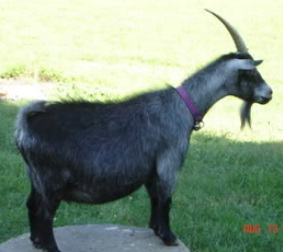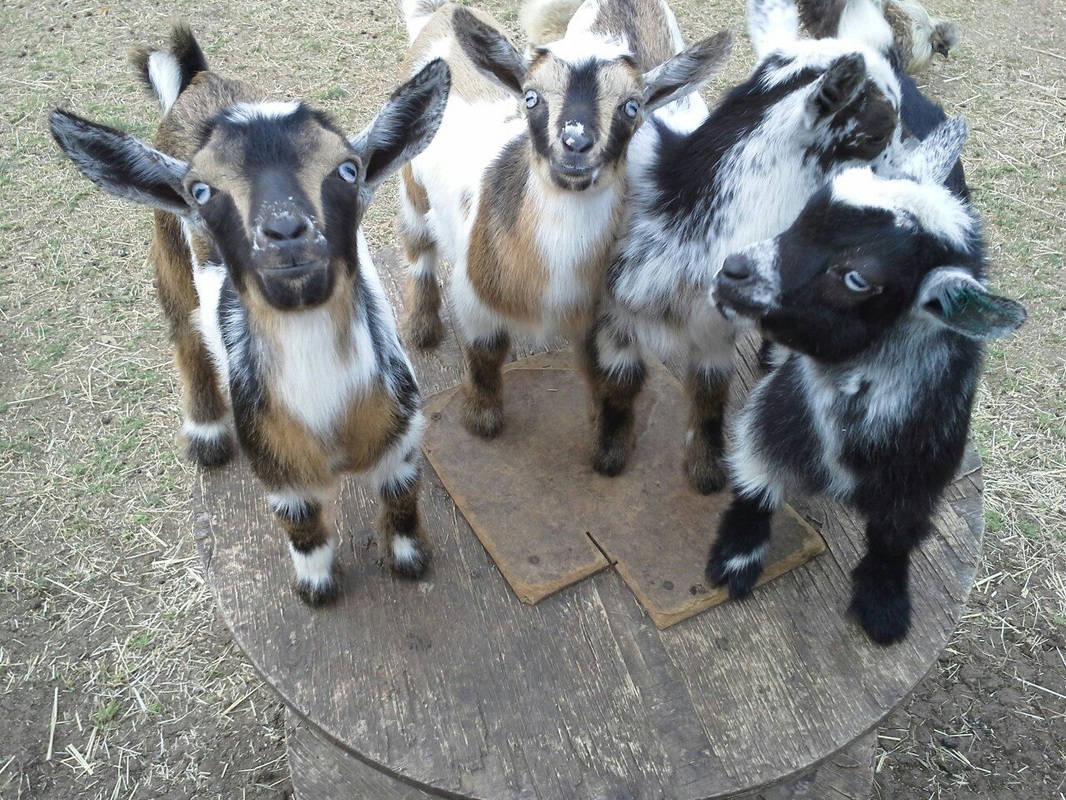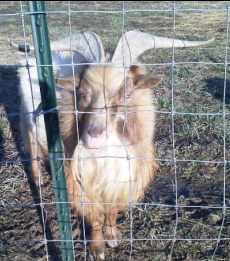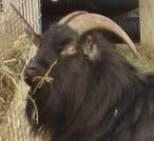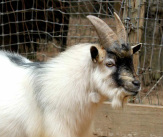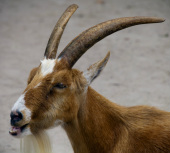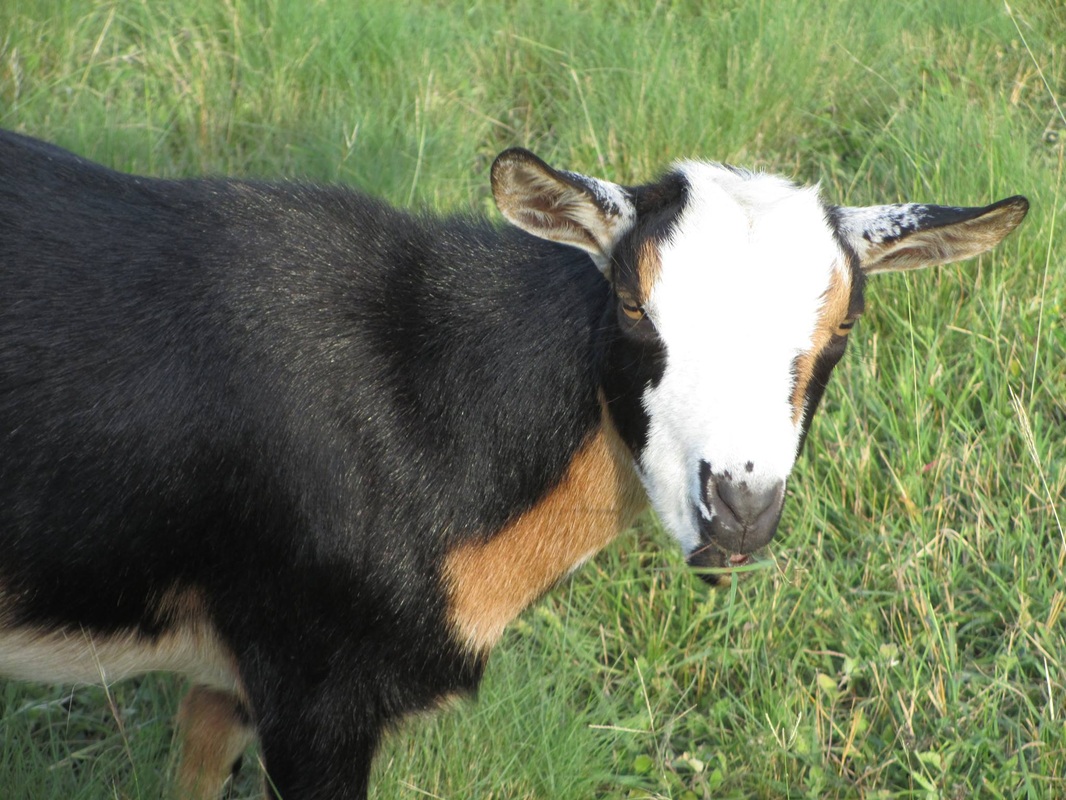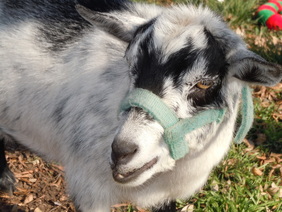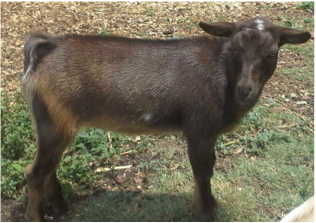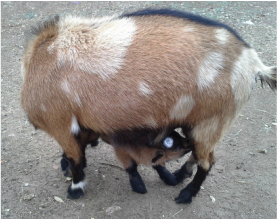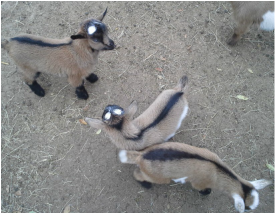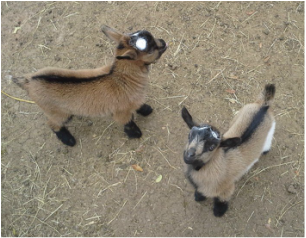Horns or No Horns?
Making the right choice for YOUR situation
|
BEFORE you get your 1st goats you should decide if you want horns or no horns. Horns have a major vein that runs through them and can not simply be cut off when you decide they get too big. |
On the left is an adult Pygmy/Nigerian cross doe with a natural set of horns. On the right is an adult Nigerian Dwarf buck with his natural set of horns. |
The most humane and safest way to get a goat without horns is to have them disbudded while they are only a few days old. You can also find naturally hornless goats (Polled). |
Do you want a goat with horns or without horns? It's one of the most common questions asked by new goat owners and the answer is not always a simple choice. Horns are beautiful, natural & sometimes beneficial to the animal but they can also be destructive & devastating. Here at Texas Skyz Dairy we have decided horns are NOT for us, but we did start with horned goats! We feel every one of our customers should make an informed & realistic decision on what is best for their lifestyle. Please understand that we personally feel "pet" or "milk" goat should NOT have horns for the safety of the goat & the caregiver. Below are a few things to consider as well as our own personal experiences with horned goats! We want to make sure you are informed and can learn from some of our mistakes! If you still feel a horned goat would best suite you we will leave horns on a kid as long as you contact us BEFORE the kid is disbudded. We disbud our kids between 3 & 10 days old!
What do you want your goat for?
This is the single most important question you should consider when thinking about getting a goat! Do you want a Pet? A Family Milk Goat? A goat to Show? Or a goat to turn out to pasture and be in it's natural elements?
If you are considering a pet or family milk goat you are expecting to have an animal you interact with on a fairly regular basis. If you choose to get a goat with horns are you willing to be ducking and dodging horns every time you are around your goat! Do you want an animal you can love on, hug on & pet? Maybe you want a lap goat or a house goat? Now picture 1-2 feet long SHARP horns on your "cuddly" goat? Do these sharp horns realistically fit the image of your pet? Crawling in your lap with those sharp horns? I'm not saying that it can't be done but please consider this! All too often "pet" goats get locked away, tied up or sold once they mature! They are no long "cute" and the true natures of those horns will shine through!
If you want to show your Nigerian Dwarf Goat, they can NOT have horns! It is required that they be without horns in the show ring! Dairy goat breeds in general can not be shown with horns! Meat goat breeds are allowed to have horns since meat goats are typically allowed to free range on open pastures while Dairy goats are in close contact with humans! Even some youth shows will require the meat breeds to be WITHOUT horns for the safely of the youth. These rules were put in place for a reason! The risks are REAL!
If you are considering a pet or family milk goat you are expecting to have an animal you interact with on a fairly regular basis. If you choose to get a goat with horns are you willing to be ducking and dodging horns every time you are around your goat! Do you want an animal you can love on, hug on & pet? Maybe you want a lap goat or a house goat? Now picture 1-2 feet long SHARP horns on your "cuddly" goat? Do these sharp horns realistically fit the image of your pet? Crawling in your lap with those sharp horns? I'm not saying that it can't be done but please consider this! All too often "pet" goats get locked away, tied up or sold once they mature! They are no long "cute" and the true natures of those horns will shine through!
If you want to show your Nigerian Dwarf Goat, they can NOT have horns! It is required that they be without horns in the show ring! Dairy goat breeds in general can not be shown with horns! Meat goat breeds are allowed to have horns since meat goats are typically allowed to free range on open pastures while Dairy goats are in close contact with humans! Even some youth shows will require the meat breeds to be WITHOUT horns for the safely of the youth. These rules were put in place for a reason! The risks are REAL!
What about protection?
Leaving horns on for "protection" will greatly depend on where you live. Do you live in an area where your goats will be exposed to many predictors? Will your goats be left out in the fields and unsupervised for long hours or days on end? If so, then yes horns may be a better option for you. A small pack of coyotes or wild dogs can easily take down a dwarf goat.... BUT a determined pack of dogs/coyotes can also easily take down a goat with horns. Just like the wild dogs in Africa, a pack of canines can take down an animal with horns. Especially a dwarf goat! Their small size makes them an easy target! If your looking to put your goats out on large plots of land, out in the country with lots of predators a Dwarf goats in general may not be for you. Horns will definitely help to deter a small or lone predator from attacking but so will the typical head bashing a goat without horns will give them. I do know of goats killed by dogs, some of them had horns and some of them didn't! When a goat is chased or stressed by a predator they can even have heat strokes & heart attacks! Often times they die with no outward bodily injury!
If you plan to keep livestock you should always consider predators! You should choose appropriate fences, including electric barriers and bring your animals into a safe pen at night! If you live in a dangerous area horns will not always save your animals!
If you plan to keep livestock you should always consider predators! You should choose appropriate fences, including electric barriers and bring your animals into a safe pen at night! If you live in a dangerous area horns will not always save your animals!
Safety of Child, Pets & Other Goats?
If you have, plan to have, or care for small children that may even occasionally be around the goat I would highly advise against horns on a dwarf goat. The Dwarf goats are just the right height to ACCIDENTALLY hit a child in the face. Even a "nice", "sweet" & "gentle" goat can accidentally turn it's head suddenly and hit a child in the face. I have been hit accidentally with horns before when we had our 1st goats. One of my sweetest does turned her head quickly and hit me in the thigh with just the point of her horn.... OMG THE PAIN! Even though she only hit a TINY spot I ended up with a BLACK & BLUE bruise that was at least 5" across! While the bruise healed fairly quickly the "point" of impact was swollen, hard & painful for months! It would not take much pressure to seriously damage a child's eye or knock out a few teeth!
The safety of other pets is also a concern! This was a big problem for us! Goats who have horns KNOW how to use them and tend to "bully" smaller animals. Our goats were constantly hitting our small dogs. Our dogs would completely ignore the goats and had learned to avoid them but that still wasn't enough. The goats would slowly sneak up on our dogs and catch them off guard. For no reason other then to "chase" them off. It got so bad my dogs were afraid to leave our porch in fear of a goat "stalking" them. The worse experience was with one of pet rabbits! We like to let our pet rabbits out into the fenced yards to run around. One of our bunnies was quietly sleeping under a tree, minding her own business, not even moving. One of our goats slowly walked up to, sniffed her and in a split second sent her FLYING across the yard! It happened so fast no one had time to react! Even the bunny didn't get a chance to run away! Thankfully the bunny did not receive any major injures and is still with us today! The "brutality" of horns didn't stop their! The goats will use their horns to slam into other goats just to show their dominance. It's not uncommon for a goat to randomly and unexpectedly slam into the side or belly of another goat. Typically this is not a problem... but... what happens what that other goat is pregnant? Or what if they slam into the full udder of your milk goat? I've heard of goats aborting kids, losing udders and although rare I've heard of goats being gored by goat! Goats in the wild are able to put a LOT of distance between them and the "dominate" herd members. Goats kept as pets are often confined to smaller areas, unable to roam and avoid the bullies. Domesticated goats are often forced to share the same shelters, food bins, hay racks & water buckets! If you plan to keep horned goats please considered multiple shelters, multiple water buckets and multiple feeding areas! That way the goats do not have to "combat" for these areas! Goats are a herd animal and enjoy the company of other goats but they have a natural instinct to maintain a hierarchy and to constantly combat for their "order" in the herd!
The safety of other pets is also a concern! This was a big problem for us! Goats who have horns KNOW how to use them and tend to "bully" smaller animals. Our goats were constantly hitting our small dogs. Our dogs would completely ignore the goats and had learned to avoid them but that still wasn't enough. The goats would slowly sneak up on our dogs and catch them off guard. For no reason other then to "chase" them off. It got so bad my dogs were afraid to leave our porch in fear of a goat "stalking" them. The worse experience was with one of pet rabbits! We like to let our pet rabbits out into the fenced yards to run around. One of our bunnies was quietly sleeping under a tree, minding her own business, not even moving. One of our goats slowly walked up to, sniffed her and in a split second sent her FLYING across the yard! It happened so fast no one had time to react! Even the bunny didn't get a chance to run away! Thankfully the bunny did not receive any major injures and is still with us today! The "brutality" of horns didn't stop their! The goats will use their horns to slam into other goats just to show their dominance. It's not uncommon for a goat to randomly and unexpectedly slam into the side or belly of another goat. Typically this is not a problem... but... what happens what that other goat is pregnant? Or what if they slam into the full udder of your milk goat? I've heard of goats aborting kids, losing udders and although rare I've heard of goats being gored by goat! Goats in the wild are able to put a LOT of distance between them and the "dominate" herd members. Goats kept as pets are often confined to smaller areas, unable to roam and avoid the bullies. Domesticated goats are often forced to share the same shelters, food bins, hay racks & water buckets! If you plan to keep horned goats please considered multiple shelters, multiple water buckets and multiple feeding areas! That way the goats do not have to "combat" for these areas! Goats are a herd animal and enjoy the company of other goats but they have a natural instinct to maintain a hierarchy and to constantly combat for their "order" in the herd!
Horns & Fences
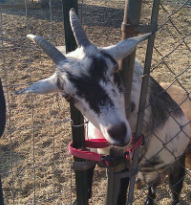
Horns & Fences is another area we had a lot of problems with! If you want to keep horned goats please take a look at your fencing! Fencing with 4X4 openings did NOT work well with our does with horns! They were constantly wiggling their heads through and getting STUCK! When you find your goat nearing a heat stroke, stuck in a fence, in our 100 degree summer heat you will QUICKLY realize how serious getting "Stuck" can be! Thankfully we were able to remove her safely, only to have her get stuck a few dozen more times before we finally removed her horns! We've had our goats get their horns stuck in trees, shrubs & other brush too!
A horned goat that is stuck in a fence is an easy target for a predator!
A horned goat that is stuck in a fence is an easy target for a predator!
Is it cruel to remove the horns?
Well that really depends on who you ask and how the horns are removed!
Disbudding:
The safest, fastest and in my opinion the most humane way to remove horns is to disbud a kid when it is between 3-10 days old. This is done before the horn starts to grow and if done properly it will kill the cells that cause the horn to grow. To disbud a kid, a specially made hot iron is applied over the horn bud for approx. 5-10 SECONDS. This is then repeated on the other horn bud. The whole process in over in just seconds and the kid is back to running and playing right away. Some kids will show signs of slight discomfort for a few minutes after but this usually subsides quickly. That's it! The worst is over! The scabs will usually fall off in 2-4 weeks and all the hair grows back shortly after. If done properly the risk is minimal and the kids bounce back so quickly! Some don't even seem phased by it! The horn bud is burned so it is sterilized and cauterized all in one. No blood, and almost no risk of infection! To date I do not personally know of anyone who has seriously injured or killed a goat by disbudding it this way. I know a lot of people who cringe at the thought simply because it's a "baby" but because they are so young they bounce back from it SO quickly and it tends to be more effective!
Pictures below were taken on a cold & misting day just minutes after babies were disbudded. Once done I let them run back to mom. Usually they nurse for a minute and then go about normal baby goat life. Running and playing with other baby goats. If done correctly babies do not act "depressed", "sad" or in excessive amounts of "pain". Sometimes they will scratch the burn or bump heads with another kid while playing. They make shake their head like it hurt for a second but they go right back to playing. They don't hide or resent us. Baby on the right looking up at me was just disbudded and waiting for me to pick him back up!
Banding:
I have banded a few adult goat's horns. I would do it again if the life of an animal depended on it BUT I personally would rather avoid it! It is very stressful for the goat, somewhat risky and overall not very pleasant! A special band is placed at the very base of the horn. Seems like a simple procedure but once the band is in place it is just terrible! The 1st 1-2 hours after the band is in place it is annoying for the goat! Goat's will thrash about trying to get the band off. I've seen them repetitively slam into things and fall to the ground in pain... Think of it as putting a rubber band really tight around one of your fingers! After the 1st few hours the horn starts to loose 'feeling' and the goats seem to become oblivious to the band for about 2 weeks.... But that is when it gets bad for the goat! As the band starts "cutting" through the horn it becomes painful! The band will SLOWLY cut off the blood supply and make it's way through the horn. Once the band is at least 3/4 of the way through the base of the horn things get VERY painful for the goat! They are afraid to move because the horn will wiggle around. They will avoid eating and avoid all other herd mates! This is when things get really risky! If the horn falls off prematurely before the band has stopped all the blood supply the goat can bleed a LOT! Now assuming all goes well (as it did for me) their will be minimal blood loss and the horns will completely fall off in 4-6 weeks. It will then take another 2-3 weeks for the area to heal over. Now keep this in mind .... I don't care how TAME your goat was before you banded it's horns don't expect it to want you ANYWHERE near it's head for the next few months! The whole process is very stressful and painful to them! They will remember it for a VERY long time! It took me at least 6 months to get my goat to trust me again! This was the same goat who was beating up my small animals and getting stuck in the fence. She is now a very sweet goat and no longer causes any problems. I feel I did what was best for her and looking back the amount of time to remove the horns vs the good life she has now I'm happy with my decision. I would however HIGHLY recommend removing horns on babies vs banding adults with horns!
Surgical:
Horns can also be removed by a vet under general anesthesia but this is very risky! First off goats do not handle anesthesia well and some die from complications of the anesthesia alone. Once the goat is put under the horn buds are surgically scooped out and removed leaving a open wound straight into the goats nasal cavity! If your goat is lucky enough to survive the anesthesia they will have a lot of drainage and oozing from the site. Bandages will need to be changed daily. It is not uncommon for these areas to get infected and since the wound now leads straight to the nasal cavity. Some goats have been known to die from the infection ! I personally would NEVER put a goat under anesthesia to remove it's horns! I know of WAY to many goats that have died from this procedure! I even know of a few who died when they were put under anesthesia so the horns could be burned with the disbudding iron as stated above! Goats just don't handle the anesthesia well! It is my belief this method should be AVOIDED unless you have an extremely experienced vet. Even then I would be skeptical! It is a very real risk that the goat will NOT survive this procedure! Personally if I had to remove horns I would choose banding over surgical removal just because of the increased risk of death to the goat.
Cutting them off:
The final way to remove horns is just plain inhuman and horrible! It should NEVER be tried by anyone!!! I have heard of people who just cut the horn straight off and "hope" the bleeding stops with enough pressure and blood stop powder... I don't even want to go into detail about this BUT the goat will bleed to death in a matter of minutes if the bleeding is not stopped! There is a major artery that runs in the horn. Think about someone just chopping your arm off and hoping they can stop the bleeding. Personally this should NOT ever be attempted! If this is the ONLY option and a goat is so bad with it's horns that it is unmanageable or dangerous to people then I believe the most human option may be euthanasia!
I have banded a few adult goat's horns. I would do it again if the life of an animal depended on it BUT I personally would rather avoid it! It is very stressful for the goat, somewhat risky and overall not very pleasant! A special band is placed at the very base of the horn. Seems like a simple procedure but once the band is in place it is just terrible! The 1st 1-2 hours after the band is in place it is annoying for the goat! Goat's will thrash about trying to get the band off. I've seen them repetitively slam into things and fall to the ground in pain... Think of it as putting a rubber band really tight around one of your fingers! After the 1st few hours the horn starts to loose 'feeling' and the goats seem to become oblivious to the band for about 2 weeks.... But that is when it gets bad for the goat! As the band starts "cutting" through the horn it becomes painful! The band will SLOWLY cut off the blood supply and make it's way through the horn. Once the band is at least 3/4 of the way through the base of the horn things get VERY painful for the goat! They are afraid to move because the horn will wiggle around. They will avoid eating and avoid all other herd mates! This is when things get really risky! If the horn falls off prematurely before the band has stopped all the blood supply the goat can bleed a LOT! Now assuming all goes well (as it did for me) their will be minimal blood loss and the horns will completely fall off in 4-6 weeks. It will then take another 2-3 weeks for the area to heal over. Now keep this in mind .... I don't care how TAME your goat was before you banded it's horns don't expect it to want you ANYWHERE near it's head for the next few months! The whole process is very stressful and painful to them! They will remember it for a VERY long time! It took me at least 6 months to get my goat to trust me again! This was the same goat who was beating up my small animals and getting stuck in the fence. She is now a very sweet goat and no longer causes any problems. I feel I did what was best for her and looking back the amount of time to remove the horns vs the good life she has now I'm happy with my decision. I would however HIGHLY recommend removing horns on babies vs banding adults with horns!
Surgical:
Horns can also be removed by a vet under general anesthesia but this is very risky! First off goats do not handle anesthesia well and some die from complications of the anesthesia alone. Once the goat is put under the horn buds are surgically scooped out and removed leaving a open wound straight into the goats nasal cavity! If your goat is lucky enough to survive the anesthesia they will have a lot of drainage and oozing from the site. Bandages will need to be changed daily. It is not uncommon for these areas to get infected and since the wound now leads straight to the nasal cavity. Some goats have been known to die from the infection ! I personally would NEVER put a goat under anesthesia to remove it's horns! I know of WAY to many goats that have died from this procedure! I even know of a few who died when they were put under anesthesia so the horns could be burned with the disbudding iron as stated above! Goats just don't handle the anesthesia well! It is my belief this method should be AVOIDED unless you have an extremely experienced vet. Even then I would be skeptical! It is a very real risk that the goat will NOT survive this procedure! Personally if I had to remove horns I would choose banding over surgical removal just because of the increased risk of death to the goat.
Cutting them off:
The final way to remove horns is just plain inhuman and horrible! It should NEVER be tried by anyone!!! I have heard of people who just cut the horn straight off and "hope" the bleeding stops with enough pressure and blood stop powder... I don't even want to go into detail about this BUT the goat will bleed to death in a matter of minutes if the bleeding is not stopped! There is a major artery that runs in the horn. Think about someone just chopping your arm off and hoping they can stop the bleeding. Personally this should NOT ever be attempted! If this is the ONLY option and a goat is so bad with it's horns that it is unmanageable or dangerous to people then I believe the most human option may be euthanasia!
